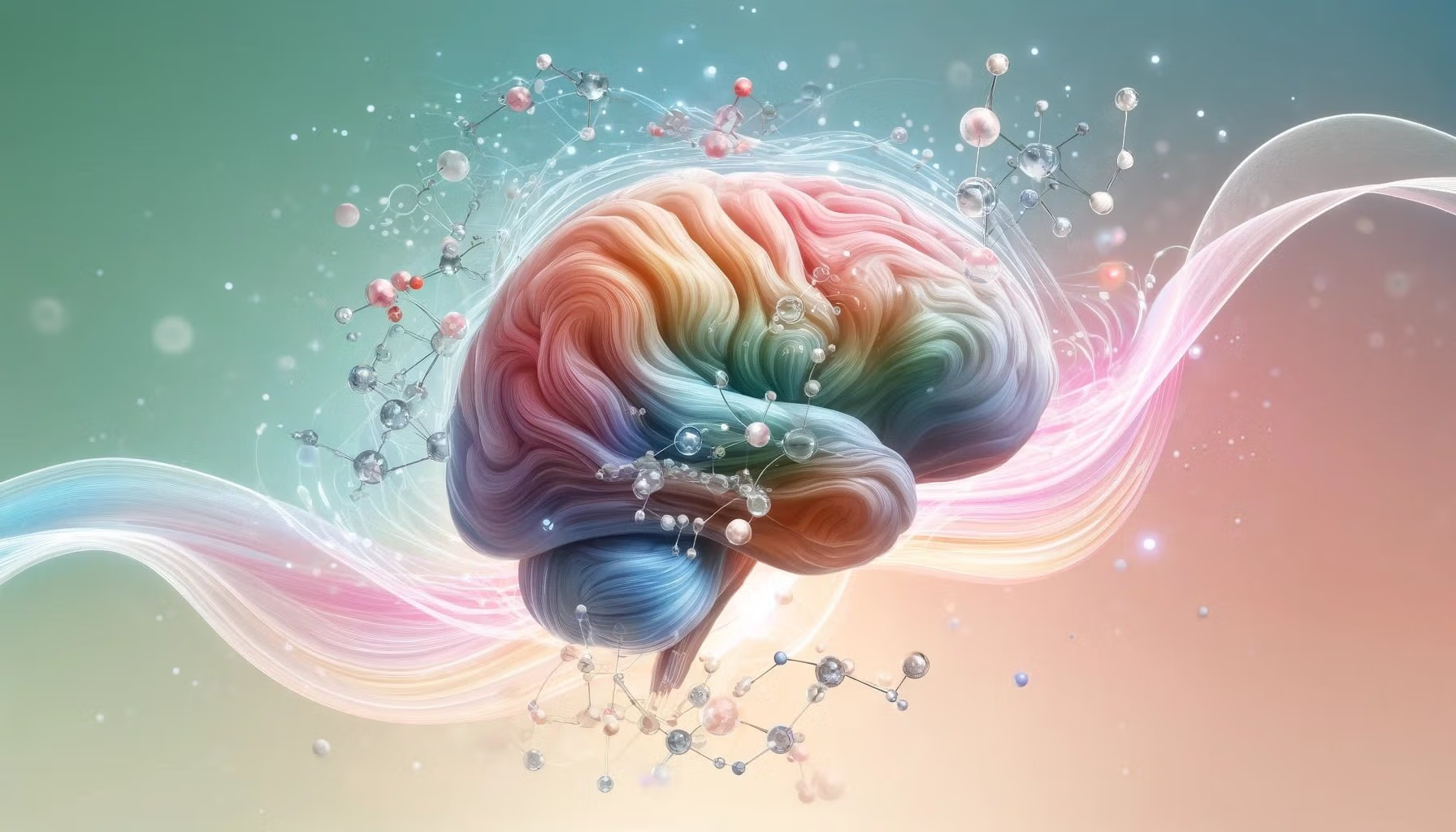
Iodine, a mineral found in rocky terrains and seashores, as well as in your common diet, plays a crucial role in thyroid function and brain health!
The benefits of iodine go beyond its ability to boost brainpower, fortify memory, and provide serenity and calmness.
Besides going into details of how iodine brings about its nootropic benefits, we’ll discuss natural sources, recommended dosages, and potential side effects.
Learn how to safely incorporate iodine into your diet and supplement regimen.
Table of Contents
What Is Iodine?
Iodine (occurring as I2 molecular crystal) is a trace mineral and essential nutrient, which can transform human health. It is found in seawater, rocks, and certain soils, and is used in thyroid hormone production.
Traditionally, iodine has been used to combat goiter (because of iodine deficiency), which enlarges the thyroid gland.
More importantly, it impacts brain development, especially in infants.(1) It also supports memory retention, learning capabilities, and promoting calmness and focus.
It operates through the synthesis process within thyroid hormones, which supports metabolic processes improving mental acuity and preventing mental impairment.
Beyond its nootropic benefits, iodine is widely utilized as an antiseptic for wound care and in radiology as a contrast agent for diagnostic imaging procedures.(2)
With global renown, iodine has a market size of a staggering $3.76 billion in 2024.
Keeping in mind the valuable knowledge of its nootropic benefits, this market size is projected to double in the next 10 years.
What Are the Natural Sources of Iodine?
Iodine is found in various natural sources, including:
- Seaweed: Richest sources
- Seafood: Cod, Shrimp, Tuna
- Dairy products: Yogurt, Milk, Eggs
- Plants grown in iodine-rich soil: Can vary based on soil conditions
How Does Iodine Function in the Body?
Iodine functions primarily in the thyroid gland, where it is used to produce the thyroid hormones thyroxine (T4) and triiodothyronine (T3).
These hormones regulate metabolism, brain development, and other vital functions through the following mechanisms:
- Protects from infections: Prevents microbial cell growth from harming neural systems
- Regulates cell functions: Inhibits bacterial growth and modulates cellular processes, e.g. oxidation of nucleotides, fatty acids, or amino acids
- Anti-inflammatory effects: Balances chemicals that cause inflammation
- Metabolism regulation: Controls the rate at which cells use energy from nutrients in the brain.
What Are the Nootropic Benefits of Iodine?
Iodine offers several nootropic benefits, particularly in supporting cognitive function, mental clarity, and preventing mental impairment.

Can Iodine Improve Memory and Learning?
Yes, iodine can improve memory and learning by ensuring adequate thyroid hormone levels.
Results from research show that such hormonal balance supports optimal brain development, strengthening neural connections essential for memory and learning.(3)
In another study, iodine supplementation in mildly iodine-deficient children led to improved memory and learning outcomes compared to a placebo group.(4)
How Does Iodine Support Mental Clarity and Focus?
Iodine provides the energy generation needed to support mental clarity and attention by regulating metabolic functions in the brain.(5)
Research suggests that adequate iodine intake helps in reducing brain fog and improving overall mental performance.(6)
Another study found that iodine supplementation in mildly deficient adults led to improvements in mental well-being and mood.(7)
Does Iodine Prevent Mental Impairment?
Iodine deficiency causes hormone imbalance, resulting in neurodegenerative disorders like Alzheimer’s and Parkinson’s.
These hormones regulate gene expression critical for brain development, including neuronal differentiation, migration, and myelination (speedy transmission of electrical signals).
According to the World Health Organization, iodine deficiency is the leading preventable cause of mental impairment worldwide.(8)
A study shows neurodegenerative disorders begin in the early stages of brain development. This means that in iodine-deficient individuals, disorders like Alzheimer’s and Parkinson’s appear earlier.(9)
How Can I Incorporate Iodine into My Diet?
Creating an iodine-rich diet is easier due to its ease of availability. However, a lack of understanding of the Iodine dosage and timing of the supplement may cause its misuse. A complete understanding of the type of access and the recommended dosage can be instrumental.

Due of its nature of use from a very young age, a close consultation must be kept with a healthcare professional for the dietary consumption of the supplement.
| Group | Recommended Dosage |
| Infants (0-6 months) | 110 μg |
| Infants (7-12 months) | 130 μg |
| Children (1-8 years) | 90 μg |
| Children (9-13 years) | 120 μg |
| Adolescents (14-18) | 150 μg |
| Adults | 150 μg |
| Pregnant Women | 220 μg |
| Lactating Women | 290 μg |
It’s important not to exceed the tolerable upper intake level of 1,100 μg/day for adults to avoid potential adverse effects.
Can Iodine Cause Adverse Effects?
While iodine is essential for health, excessive intake can lead to various side effects. Learning about its downsides may aid in avoiding long-term risks is crucial for safe supplementation and overall well-being.
What Are the Potential Side Effects of Iodine?
Yes, excessive iodine intake can cause the following adverse reactions:
- Allergic Reactions: Skin rashes, hives and itching
- Thyroid Dysfunction: Hyperthyroidism or hypothyroidism
- Gastrointestinal Distress: Nausea, stomach pain and diarrhea
- Metallic Taste: Unpleasant taste
Are There Any Long-Term Risks Associated with Iodine Supplementation?
Long-term excessive iodine intake can lead to thyroid dysfunction and autoimmune thyroid disorders:
- Chronic Thyroiditis (Inflammation of the thyroid gland)
- Thyroid Cancer Risk
- Renal Impairment
- Autoimmune Thyroid Disease (Hashimoto’s thyroiditis)
How Does Iodine Deficiency Affect Cognitive Function?
Iodine deficiency impacts brain development, particularly during early growth periods. It can lead to mild cognitive impairments and some physical symptoms.
General symptoms from such side effects direct to taking adequate iodine intake for maintaining overall health and mental performance.
What Are the Symptoms of Iodine Deficiency?
Iodine deficiency can manifest through a variety of symptoms, which can help in addressing the deficiency and mitigating long-term health consequences:
- Goiter: Enlargement of the thyroid gland, visible as a swelling in the neck
- Hypothyroidism: Fatigue, weight gain, cold intolerance, depression
- Dry Skin and Hair: Dry, flaky skin, brittle hair
- Slowed Metabolism: Weight gain and low energy levels
- Cognitive Symptoms: Memory problems, difficulty concentrating, reduced brain functioning
- Developmental Delays: Growth and developmental delays
What Are the Cognitive Implications of Iodine Deficiency?
Iodine deficiency can lead to various cognitive impairments, affecting individuals from infancy through adulthood:
- Reduced IQ: Iodine deficiency during critical developmental periods can result in a lower IQ
- Impaired Learning: Difficulty in learning and retaining new information
- Memory Deficits: Short-term and long-term memory can be adversely affected
- Attention Deficits: Reduced ability to focus and sustain attention
- Developmental Disorders: Severe iodine deficiency during pregnancy can lead to cretinism
- Cognitive Decline in Adults: Chronic iodine deficiency can lead to cognitive decline and reduced mental performance
Are There Any Interactions Between Iodine and Other Substances?
Iodine can interact with various substances, affecting its absorption and utilization in the body. For instance, certain foods and medications can influence iodine levels.
Can Iodine Interact with Medications?
Iodine can interact with various medications, affecting their efficacy and potentially leading to adverse effects:
- Antithyroid Medications (e.g. methimazole and propylthiouracil): Hyperthyroidism
- Lithium: Hypothyroidism effects may occur
- ACE Inhibitors (e.g. captopril or enalapril): Affect kidney function
- Diuretics: Risk of hyperkalemia
- Amiodarone: Heart rhythm-related thyroid dysfunction
- Potassium iodide: Induces hyperthyroidism
How Does Iodine Affect Other Nootropic Supplements?
Coupling Iodine with other nutrients can pose some challenges in managing other health conditions:
- Omega-3 Fatty Acids: Enhances cognitive benefits
- Bacopa Monnieri: Strengthens memory retention and attention span
- Ginkgo Biloba: Improves brain blood flow and prevents inflammation, but should be monitored for blood thinning effects
- Rhodiola Rosea: Supports mental performance and stress management
- L-Theanine: Improves focus and relaxation
- Caffeine: Enhances mental alertness, but excessive caffeine can cause jitteriness
- Creatine: Boosts cellular energy production and cell growth
- Lion’s Mane Mushroom: Supports nerve growth and cell maintenance
What Precautions Should I Take When Using Iodine with Other Supplements?
When using iodine supplements, it’s important to be aware of potential interactions with other supplements and not exceed the recommended dosage:
- Consult a healthcare provider
- Monitor thyroid function
- Avoid excessive doses
- Balance nutrient intake
- Check for allergies
- Stadel, B. V. “Iodine and Thyroid Function.” The American Journal of Medicine, vol. 85, no. 4A, 2012, pp. 13-18.↩
- World Health Organization. Assessment of Iodine Deficiency Disorders and Monitoring Their Elimination: A Guide for Programme Managers. 3rd ed., WHO Press, 2009.↩
- Velasco, I., Bath, S. C., Rayman, M. P., & Iodine Working Group, European Thyroid Association. (2018). Iodine as an essential nutrient during the first 1000 days of life. Nutrients, 10(3), 290.↩
- Srivastava, Rashika, et al. “Iodine supplementation improved antioxidant status, hormonal status, sexual behavior, and semen production performance of Bos indicus bulls under tropical climatic condition.” Biological Trace Element Research 200.11 (2022): 4690-4703.↩
- Kränkel, Nicolle, et al. “Hyperglycemia reduces survival and impairs the function of circulating blood-derived progenitor cells.” Arteriosclerosis, thrombosis, and vascular biology 25.4 (2005): 698-703.↩
- Zimmermann, Michael B., and Kristien Boelaert. “Iodine deficiency and thyroid disorders.” The lancet Diabetes & endocrinology 3.4 (2015): 286-295.↩
- Redman, Kahla, et al. “Iodine deficiency and the brain: effects and mechanisms.” Critical reviews in food science and nutrition 56.16 (2016): 2695-2713.↩
- World Health Organization. Assessment of Iodine Deficiency Disorders and Monitoring Their Elimination: A Guide for Programme Managers. 3rd ed., WHO Press, 2007.↩
- Delange, F. “Iodine Deficiency as a Cause of Brain Damage.” Postgraduate Medical Journal, vol. 77, no. 906, 2001, pp. 217-220.↩

